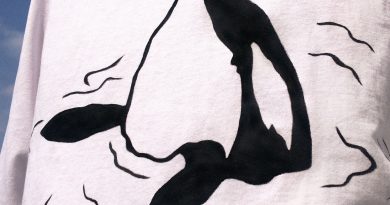A Chat with Marc Schuster (27.10.23)
Filled to the brim with passion swirling about in an organised sense of chaos, Marc Schuster is a whirlwind of constant energy trapping you in his insatiable soul-soaring sound. With a finger in several pies, Schuster is a college professor, artist, musician, radio presenter and an all-around great guy. We speak with him about his single ‘I Don’t Bleed’, what music means to him, future plans and much more.
OSR: Let’s jump straight in: you recently released the single ‘I Don’t Bleed’. What can you tell us about it? Is there a backstory or theme?
Schuster: That song is a bit of an exquisite corpse. I stitched it together from a few different pieces. I recorded the music over the summer, but I was struggling with the lyrics. I had the first verse, but I couldn’t think of where to go with them, so I went back and looked at lyrics from older songs of mine that never came to fruition. The second and third verses came from a song called ‘Rats’, which I probably started working on in 2019, and the chorus came from a completely different song I wrote called ‘I Don’t Bleed’ back in 1996 or so.
OSR: What do you hope people take from it?
Schuster: I want the song to create a sense of mystery. One of my favourite TV shows of all time is The X-Files, and I like to think of ‘I Don’t Bleed’ as something akin to an episode of that show in miniature. There’s this weird, bloodless mutant of some kind living underground and refusing to die, and he’ll be around to see the end of the world. What is he? Who is he? Where did he come from? And then there are the bigger, existential questions. What does this creature portend? Is he a harbinger of something? If so, what? How does the fact that the rest of us do, in fact, bleed, say something about what we all have in common?
OSR: If you could change one thing about ‘I Don’t Bleed’, what would it be?
Schuster: It feels a little repetitive to me. I know that’s partially because music relies on repetition, but I probably could have switched things up a little more.
OSR: What does music mean to you?
Schuster: I feel like music is a thread that draws humanity together. It’s like our collective through-line, mutating and evolving as we do. I love reading books about music and learning how people came together to create bands or scenes or movements, or how historical events or even technological developments gave rise to musical trends. It’s like this spirit that’s always been alongside us, the instinct to create music and to engage in the ongoing dialogue that is music.
OSR: Along with your full-time job as a college professor, writer and radio show presenter, you perform with bands like Scoopski and The Star Crumbles. How do you find the time to fit everything into a regular day?
Schuster: I can’t sit still. Every now and then, I’ll try to sit down and watch a movie, and five minutes into it, I’m reaching for my guitar because I’m bored. I don’t know why exactly, but if I’m not doing something or making something I just start to feel antsy at best – and depressed at worst. Which means I end up filling my days with various projects or even fragments of projects, little ideas that get attached to other little ideas and start to form bigger ideas over time.
OSR: How do you feel you’ve grown as a musician over the past several years?
Schuster: I used to be a lot more solitary in my musical pursuits. I’d work with other people on occasion, but it never really went anywhere. In a weird way, COVID allowed me to start seriously working with other people, first with my cousin Vince in our band The Ministry of Plausible Rumours, and then, when the pandemic started loosening its grip, with Brian Lambert in The Star Crumbles. Around the same time, I really committed to interviewing musicians on my blog, and that opened up a lot of doors for me in terms of collaboration. The main reason I’m playing bass with Scoopski now is that I mentioned in passing during the interview that I’d be up for the job if he ever needed a bass player.
OSR: Based on your musical history, you tend to explore various genres from rock to electronica. What is your favourite genre to date?
Schuster: I always fall back on some version of rock. Some of my earliest musical memories involve listening to the Beatles’ White Album in the family station wagon. It’s such a wide-ranging and eclectic album with the classic rock‘n’roll sound of ‘Back in the USSR’, the country and western of ‘Don’t Pass Me By’, and even the wild experimentation of ‘Revolution 9’. But, broadly speaking, it’s all rock. It’s a big tent, I suppose, and one I always return to.
OSR: What advice do you have for new artists?
Schuster: Do it because you like it, whatever “it” is. I’ve seen so many artists of various stripes get frustrated because they don’t feel like they’re reaching a large enough audience or because they feel like they want to reach that mythical “next level” everyone’s always talking about. But I feel like doing that is playing the game that the music and tech industries want you to play. It’s letting tangential issues get in the way of doing the thing you initially set out to do, which is to create something new and different. Focusing on the act of creation and enjoying the process will keep you moving forward as an artist and, with any luck, keep you from worrying about the other stuff.
OSR: If you were to recommend your music to a listener, what song would you introduce yourself with?
Schuster: It’s hard to pick a single song since, as you mentioned earlier, my endeavours tend to be fairly eclectic. That said, I’ve been trying recently to bring my various interests together and leaning into something more experimental. A little more “out there”’, I guess you could say, so for now I’m going to go with a song I have coming out in December called ‘Read the Room’. My buddy Quizboy described it as ‘stark and vibey’, and I think that’s an apt description. I’ve been feeling a little stark and vibey lately.
OSR: Do you have any future plans?
Schuster: I always have a few irons in the fire, like keeping the blog going and producing new episodes of the radio show. I also have some singles coming out over the next few months. There’s a cover of Failure’s ‘Daylight’ that will be on a compilation, and then there’s a new Star Crumbles single that will be out in November. That one’s called ‘Joke’s on Me’. Then, of course, there’s ‘Read the Room’. And I also just finished recording a holiday tune called ‘Krampus is Coming’ for a compilation that Audio Mirage Studios is putting out.
OSR: Do you have a message for our readers?
Schuster: I do want to say thanks to everyone who supports indie music. We live in a culture that tries to tell us that everything has to be huge to be meaningful, and the machinery of that culture is geared toward mass consumption. To be a music lover and to support indie music in this environment takes a bit of work, so I’m incredibly grateful to anyone who takes the time to find new music and give it a chance. The fact that every once in a while someone hears something we’ve done and, if we’re lucky, likes it reminds artists like me that the big reason we do what we do is to make human connections.
Many thanks to Marc Schuster for speaking with us! Find out more about Marc Schuster via his official website, Facebook, Twitter, Instagram and Spotify.
Discover more post-punk tunes on The Other Side Reviews Post Punk playlist:


